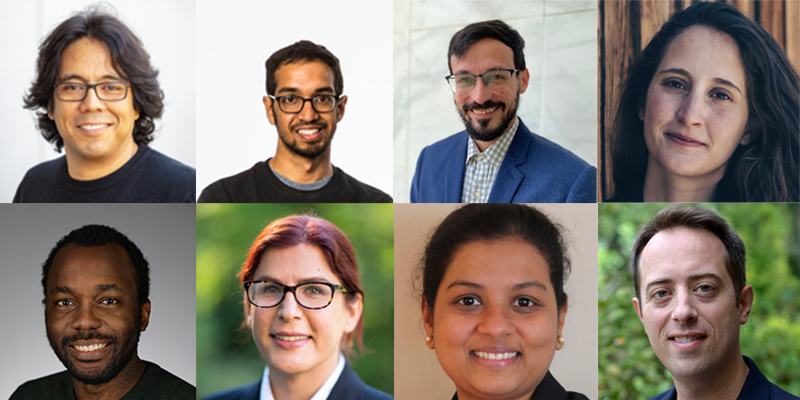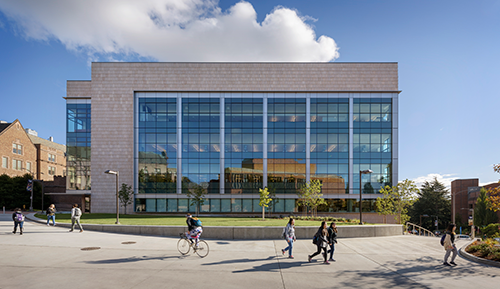
The Institute for Nano-engineered Systems (NanoES) is thrilled to welcome eight new faculty members for the 2021-22 academic year. With research ranging from the development of bio-inspired, lightweight sensors to engineering infrastructure for quantum systems, these faculty members are poised to help develop solutions to grand challenges in information processing, energy, health, and interconnected life.
“Each of these faculty members brings unique talent and expertise to the Institute,” said Böhringer. “We are excited to be able to bring together such a diverse group working at the frontiers of research areas of interest to NanoES.”
The faculty come from the departments of Chemical Engineering, Computer Science & Engineering, Electrical & Computer Engineering, Mechanical Engineering, and Materials Science & Engineering.
Juan Carlos Idrobo
Associate Professor, Materials Science and Engineering
Idrobo is a material physicist, with expertise in experimental electron energy-loss spectroscopy (EELS), scanning transmission electron microscopy (STEM) and theoretical calculations based on density functional theory (DFT). He is interested in pushing the boundaries and applications of EELS in STEM to study materials at the atomic and nanometer scale. His research synergistically combines analytical electron microscopy with first-principles methods to reveal the structure-property relationships in a plethora of material physics problems, in particular the influence of point and extended defects on macroscopic properties.
Vikram Iyer
Assistant Professor, Paul G. Allen School for Computer Science & Engineering
As a graduate student in the UW Department of Electrical and Computer Engineering, Iyer worked with professors Shyam Gollakota and Sawyer Fuller on wireless technologies for resource constrained platforms. His team built a lightweight sensor system that can be carried by small drones or flying insects to collect data in remote areas. He also worked with Microsoft Research to build a low-cost cloud-connected environmental sensing platform to monitor air quality in cities. Iyer’s work in tracking technology helped Washington state entomologists locate dangerous Asian giant hornet nests and earned him Geekwire’s Innovation of the Year Award. As an assistant professor, he plans to continue building bio-inspired and bio-integrative wireless sensors.
Jorge Marchand
Assistant Professor in Chemical Engineering
Marchand’s research focuses on engineering organisms and enzymes to produce next-generation therapeutics, biochemicals, and biomaterials. He utilizes fundamental approaches in synthetic biology, chemical biology, biosynthesis, and biomolecular engineering to both extend the amino acid, nucleic acid and carbohydrate building blocks available in living systems for biosynthesis, and to use newly expanded metabolism to produce biomolecules with unique chemical and physical properties. At the UW, he plans to use both discovery and design to engineer proteins, pathways and organisms capable of making new-to-nature products.
Sara Mouradian
Assistant Professor, Electrical & Computer Engineering
Mouradian’s research interests include engineering control infrastructure for large trapped-ion quantum systems without degrading the quantum memory storage time. As an Intelligence Community Postdoctoral Fellow at UC Berkeley, Mouradian worked to demonstrate a multi-register optical control system for trapped-ion quantum sensing. At the UW, Mouradian plans to continue her work in photonic engineering and atomic physics to develop improved quantum systems. By using a fully integrated photonic control system, she aims to increase control and connectivity of engineered quantum systems, and apply these systems to test quantum technologies.
Ayokunle Olanrewaju
Assistant Professor, Mechanical Engineering
Olanrewaju’s research applies principles from the physical and life sciences to solve pressing problems in diagnostics, precision medicine, and translational bioengineering. He uses 3D microfabrication, autonomous microfluidics, and molecular assays for rapid and user-friendly monitoring of medications to prevent treatment failure and improve healthcare outcomes. He aims to develop automated devices for healthcare monitoring at the point of need whether in a doctor’s office or a patient’s home.
Lilo Pozzo
Boeing-Roundhill Professor for Excellence in Engineering, Interim chair in Materials Science and Engineering
Research in the Pozzo group centers on the development, measurement and control of self-assembly processes for soft materials over nanometer and micrometer scales. This manipulation of complex material structures results in novel properties that optimize their use in engineering applications ranging from solar energy to nanomedicine.
Chinmayee Subban
Affiliate Professor, Materials Science and Engineering
Subban is a Research Scientist in the Coastal Sciences Division at the Pacific Northwest National Laboratory and Affiliate Professor at the UW. At PNNL, she works on nanoscale ion-water transport, recovery of critical materials from seawater, development of advanced ceramics, materials for desalination and water treatment, ocean CO2 capture, and coastal resilience.
Christopher Thachuk
Assistant Professor, Paul G. Allen School for Computer Science & Engineering
Thachuk’s research focuses on applying principles from computer science and engineering to create programmable matter at the nanoscale with bio-molecules such as DNA. He uses DNA and other substrates to program smart molecules that can sense their environment, perform robust and complex computations, and actuate a response at the nanoscale. He aims to build molecular processing architectures using DNA’s natural interface with chemical and biological systems and use molecular computers as a new avenue to store and process information electronically to enhance smart medicine, materials and manufacturing.
